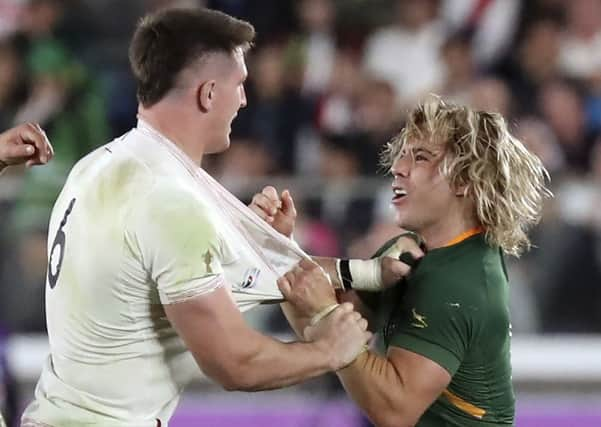Iain Morrison: Rugby isn’t a global game, it’s a goldfish bowl


“Since one week!” came the enthusiastic response.
This was supposed to be the World Cup to open up the huge, HUGE, Asian markets to rugby but that always seemed a little fanciful. Once the RWC bandwagon packs up and rolls out of town, you suspect that the Brave Blossoms will revert to playing in front of 20,000-odd fans at the modest Prince Chichibu Stadium, although I would love to be proved wrong.
The Japanese hosts were the friendliest, most helpful folk anyone could imagine. They made 2019 Rugby World Cup the success it was despite typhoon Hagibis and the fact that there was precious little attacking rugby played in the latter stages. Defence wins Tests, is the obvious lesson – let’s see if Gregor Townsend agrees.
Advertisement
Hide AdAdvertisement
Hide AdWales are the antithesis of Scotland but if Townsend’s team are inclined to play a little too fast and loose, Warren Gatland’s side didn’t play any rugby at all. Wales were never going to bludgeon South Africa into submission. Never. Any kudos Gatland deserves for coming close is wiped out by his obstinate tactical inflexibility.
Yesterday’s match was a rerun of the 2007 final in France between England and South Africa but reruns are inevitable because the nine World Cup finals we have had to date have been contested by only five nations: England, France, New Zealand, South Africa and Australia.
To compare and contrast, the last three football World Cup finals have involved six different nations. The global TV audience for the 2015 Rugby World Cup final was 120 million (2019 figures are not yet available). France v Croatia, soccer’s 2018 equivalent, was watched by almost 1.2 billion. That is almost 1,000 football enthusiasts for every rugby fan.
Rugby isn’t a global game, it’s a goldfish bowl with the vast majority of the world’s population on the outside, not even pretending to peer in.
World Rugby is getting on top of the injury crisis but they are swimming in circles when it comes to broadening the pinnacle of the sport which has shrunk to exactly three teams: England, South Africa and New Zealand.
Rugby union is the fourth most popular winter sport in Australia and with Scott Johnson at the helm you will already have decided for yourself how that story ends.
France could be competitive but not until they hand the reins to Vern Cotter, pictured. Ireland peaked too soon, Wales were stuffy but desperately limited while Scotland, Argentina and Italy have all regressed in recent years.
They are not the only ones. Second-tier nations have also gone backwards with the honourable exception of the 2019 hosts who beat Ireland and Scotland. Tonga were competitive but Samoa much less so and the only upset Fiji produced was that spectacular own goal against the minnows’ minnows, Uruguay.
Advertisement
Hide AdAdvertisement
Hide AdAnd please don’t even mention the “sleeping giant” that is the USA Eagles. The giant is not sleeping, it is comatose, unable to win a match, conceding an average of 39 points per outing and hopelessly unprepared to challenge, never mind join, the elite. The lack of competition was reflected in the group stage. Several Pool D matches involving Australia, Wales, Fiji and Uruguay went down to the wire but events elsewhere were hopelessly lopsided. Pool A boasted only two close-ish games, both involving the host nation Japan, while Pool C also had two nailbiters, as France squeezed past Tonga and Argentina by the same 23-21 score. New Zealand were pushed by South Africa on the opening weekend in Pool B but that was that.
Throughout the 37 pool matches (three were cancelled), only nine could be called proper contests.
The pinnacle of Test rugby is minuscule and likely to stay that way because the entry ticket is prohibitively expensive.
In no particular order, a nation needs: a steady stream of players engaged in a top-class, professional league; a meaningful competition for the senior national side to finance the whole shebang; a well-organised youth/school/academy structure; large, well-appointed stadiums for both national and club teams, plus fans with the moolah and enthusiasm to fill them; top-class coaches and all the myriad other support staff that you and I don’t even know exist.
USA Rugby, to take only one example, ticks none of those boxes as yet, although they do have a (second-class) professional league, so even if they were to get all the above delivered to their doorstep tomorrow, the Eagles still wouldn’t be in a position to challenge the status quo for another decade or more.
No one is looking beyond the big three for the 2023 Rugby World Cup in France, at least no one other than our enthusiastic Japanese friend in Roppongi. She is already focusing on the next huge, HUGE, thing, the 2020 Tokyo Olympics. As is the rest of the sporting world.